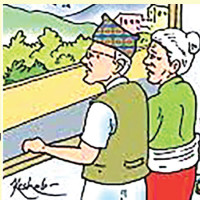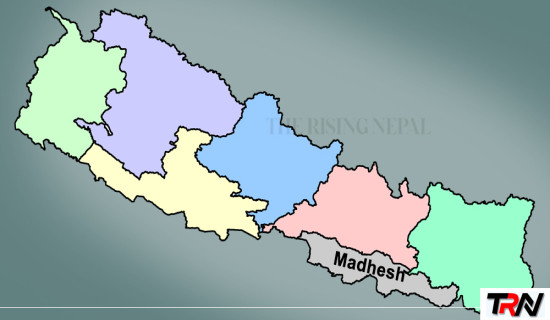- Friday, 27 February 2026
Dedication, hard work create wonders: Tripathy
The National School of Drama (NSD) in India has a significant legacy in theatre, film and overall art canvas. Several influential theatre/film actors, including Nasiruddin Shah, Om Puri, Irfan Khan and Nawazuddin Siddiqi graduated from NSD have made impressive contributions to the development of arts.
Senior Nepali theatre actors and directors Sunil Pokharel and Anup Baral are also NSD fellows.
Indian actor, director, music composer and writer Chittaranjan Tripathy, who also graduated from NSD, is now leading the NSD as its director.
As an artist, Tripathy has already achieved big success in theatre and film in India.
Besides playing the role of Trivedi in the popular Netflix web series Sacred Games, Tripathy has directed and acted in several popular films, web series and plays such as ALT Balaji, ZEE5 and MOM.
Tripathy’s most famous Indian play ‘Taajmahal ka Tender’, was performed at Rastriya Naach Ghar, Jamal, Kathmandu, during the closing ceremony of ‘Nepal-Bharat Ranga Mahotsav’ (theatre festival) on Wednesday.
The six-day theatre festival was organised in collaboration between the governments of Nepal and India in Kathmandu. Tripathy attended the closing ceremony of the theatre festival as a special guest. He talked to Raman Paudel of The Rising Nepal on the condition of theatre and cinema in Nepal and India. Excerpts:
Firstly, congratulations to you and your team for concluding Nepal-Bharat Ranga Mahotsav successfully. What are your remarks about this theatre festival ?
This Nepal-India Theatre Festival organised in a government-level collaboration between Nepal and India is a platform to share and exchange each other’s art and culture.
For me, it was a good experience and a great initiative. It was a great opportunity to exchange cultural activities between the artists of Nepal and India. This platform has also facilitated connecting people of the two nations, sharing perspectives and great ideas and renewing friendships.
How do you observe the Nepali theatre, cinema and other forms of art ?
Yes, Nepal is rich in ancient culture. Nepali theatre is quite strong. I have noticed that several theatre activities and training have, of late, been increasing. I found Nepali theatre artists showing great enthusiasm for learning.
Where is the Nepali theatre when it is compared with the theatres of other South Asian nations ?
Why should I compare it with others? Every country has its difficulties and identity. I think I should not compare Nepali films with Bollywood or Hollywood films. Because Hollywood films have their storytelling ideas and Nepali films have their own. American plays reflect American society and Nepali plays reflect Nepal’s society. There is nothing to compare any cinema or play with others.
What do you think about criticism from several Indian artists, including Nasiruddin Shah, a fellow of NSD, regarding the influence of politics in Bollywood films and art ?
That’s their personal opinion. I do not comment on that.
A few months ago you commented that Bollywood star Shah Rukh Khan is a ‘Natakwala’ first and ‘Superstar’ later. What was the background for making such comments ?
When he was young, he started his career in theatre. He got acting training from theatre. If somebody comes from theatre or starts his career in theatre, he makes a difference. When it comes to Shah Rukh Khan, he is also from a non-film background.
His improvement is so big that he is an inspiration to all theatre artists. This is why, for me, he was first ‘Natakwala’ and ‘Superstar’ later.
I consider him a brilliant actor as he has a big fan following. The statement I made was substantial to richness how it helps somebody to become a superstar in the art industry.
While a theatre artist always has a big dream to become a superstar or he or she always seeks an opportunity to shift to commercial movies. Can’t we say theatre artists have been facing challenges to survive and theatre is in a danger zone ?
No, I do not agree with this. There is no problem of survival in theatre. If you focus on theatre, you have no survival problem. However, if you focus somewhere else and just do theatre acting, there will arise problems. I have seen many people including myself, who have done a good job while remaining in theatres.
But what do you think why does every theatre artist always seek a career in commercial movies while the theatre and films are two different genres ?
Yes, every artist and actor wants to go to the cinema. It’s a normal tendency to reach out to the masses. I consider the cinema as the most powerful means of communication. So reaching out to the big population is easier through cinema. That is the reason why most artists aspire to shift to cinema. There is nothing wrong with it.
Coming to your personal experience, what are the challenges you faced as an art performer or an administrator (director of NSD) ?
As a director of NSD, I have a huge responsibility as it has a huge legacy. Many great people have graduated from NSD. Also, this particular position has been headed by many directors like Ebrahim Alkazi. So it’s a huge responsibility.
Coming to my art performance, it’s also challenging. I would say, every segment has its challenges. Every segment has its own set of responsibilities. We can’t compare one with the other.
What would be your final suggestion to Nepali artistes and all art performers ?
Nepali artists have already done a good job in their area. They need to focus and work hard. If we focus and dedicate ourselves to work, we can create wonders.















